Leonard
Leonard's admission to a local DFW hospital for a planned left ventricular assist device (LVAD) placement took an unexpected turn when he experienced a series of medical complications.
Learn more about Leonard
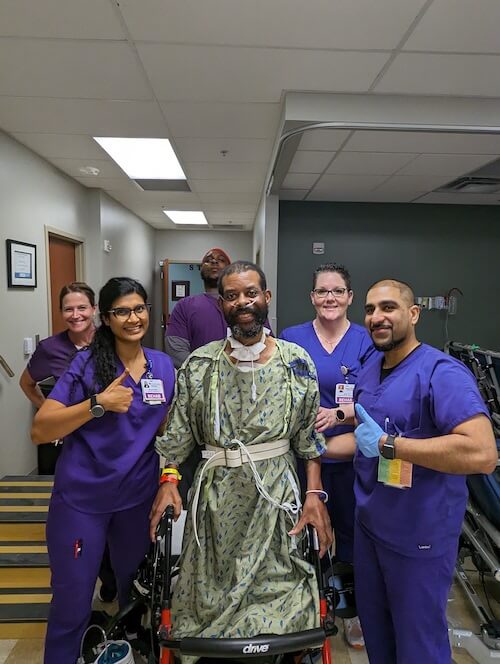
Leonard's admission to a local DFW hospital for a planned left ventricular assist device (LVAD) placement took an unexpected turn when he experienced a series of medical complications. As a result, he had to be placed on a ventilator. After his condition improved, Leonard was transferred to Kindred Hospital Dallas Central for further medical care and extensive rehabilitation.
Upon arrival at Kindred, Leonard was dependent on a ventilator and unable to ambulate. He relied on the care team for all activities of daily living (ADLs). The interdisciplinary team promptly developed a care plan with the primary objective of liberating Leonard from the ventilator and ensuring a speedy and successful recovery. Although Leonard faced initial difficulties due to confusion and agitation, he worked tirelessly with his respiratory therapists to strengthen his lungs, which led to his liberation from the ventilator. This improvement in his lung strength not only boosted his motivation but also enhanced his cognitive state.
Motivated by his care team on a daily basis, Leonard engaged in physical therapy and occupational therapy to improve his muscular endurance. His dedicated efforts paid off as he achieved success in performing general transfers, ambulating, and executing general ADLs. In a little over a month, Leonard surpassed all the goals set in his care plan, indicating significant progress in his recovery. As a result, he was discharged to Kindred Hospital Dallas Central's Acute Rehabilitation Unit to continue his rehabilitation and finalize his journey towards a full recovery. Leonard eagerly looked forward to returning home. From the entire team at Kindred, we wish Leonard all the best in his recovery.
Zachary
Zachary's journey following his severe motor vehicle accident has been challenging but filled with progress and success.
Learn more about Zachary
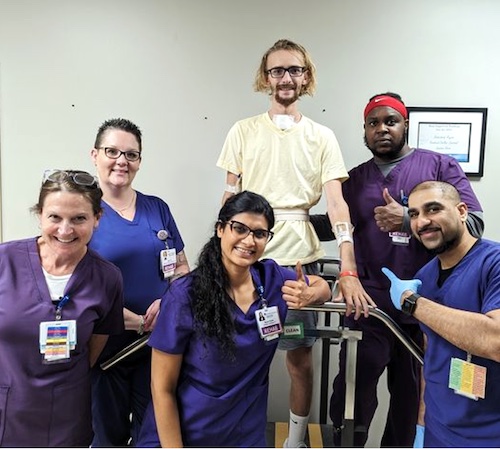
Zachary's journey following his severe motor vehicle accident has been challenging but filled with progress and success. After being rushed to the ER at a trauma hospital in Waco-Texas he was diagnosed with a traumatic brain injury resulting from the impact of the collision. Once his condition stabilized, he was transferred to Kindred Hospital Dallas Central for further medical care and extensive rehabilitation.
Upon his admission at Kindred, Zachary underwent a thorough evaluation by the interdisciplinary care team. Based on his medical condition, a personalized care plan was developed to address his specific needs and goals. The primary objective of the care team was to help Zachary wean off the ventilator and assist him in regaining his strength and independence. Motivated to recover, Zachary worked tirelessly with his respiratory therapist to gradually wean off the ventilator. As his lungs grew stronger, his overall body strength increased as well. With the support of his physical therapist and occupational therapist, Zachary engaged in vigorous exercises to improve his strength and mobility. Through dedicated effort, he achieved remarkable progress and was able to wean off the ventilator and ambulate 500 feet with limited assistance while performing general activities of daily living (ADLs).
Zachary's commitment and hard work led to consistent success in surpassing the goals set in his care plan. Following his stay at Kindred Hospital Dallas Central, Zachary was discharged to a lower level of care, where he can continue his rehabilitation and recovery journey. From the entire team at Kindred, we wish Zachary all the success.
Thomas M
“I am thankful for the care you gave me – my experience here at
Kindred has been really good overall.”
Thomas has been battling a chronic heart condition for several years and
recently had to be admitted to an acute care facility after he developed a
serious infection in his left foot.
Learn more about Thomas M
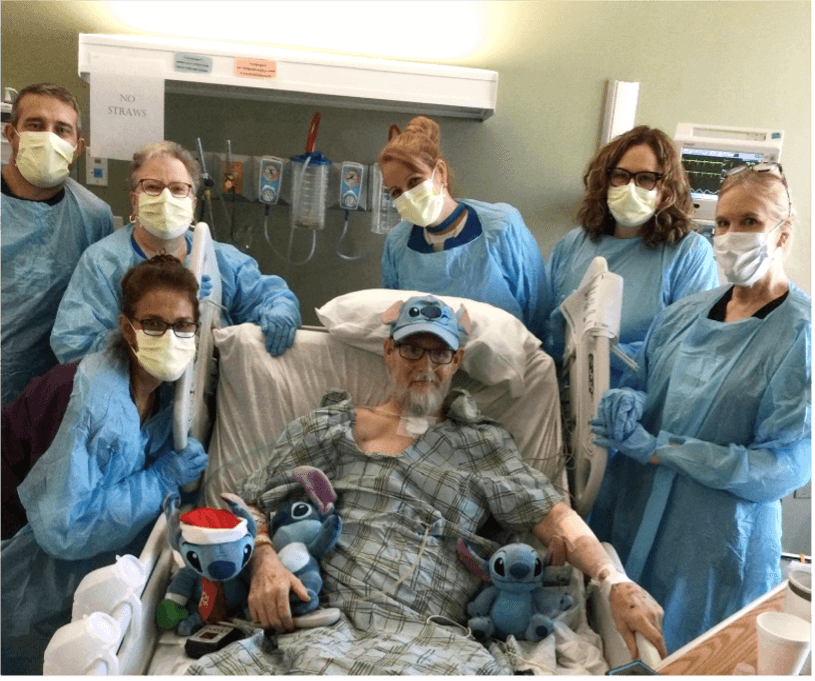
He was diagnosed with a GI bleed and acute sepsis and had to be placed on a
ventilator as he developed pneumonia that led to respiratory failure. Thomas
became unresponsive, but fortunately he was stabilized and then transferred
to Kindred Hospital Dallas Central. Once he was admitted Thomas began to
receive aggressive respiratory therapy. He responded quickly to his
treatments and was successfully weaned from the vent. Buoyed by a positive
attitude and constant support from his family and team, Thomas participated
eagerly in his rehab therapy sessions and began to regain his strength,
mobility and independence. During his recovery process Thomas became very
involved with drawing and coloring, and he worked on his video game skills
to help him stay engaged and ward off boredom and anxiety. Thomas began to
be affectionately called ‘Stitch’ after the cartoon character
with whom he told his caregivers he identified and who is a favorite of his
10-year-old son. Thomas met all of the recovery goals and said that he
looked forward to returning home to his family once his journey to recovery
was complete.
“I am thankful for the care you gave me – my experience here at
Kindred has been really good overall,” Thomas shared before he was
discharged.
Thomas K
“I just want to say thank you to everyone who cared for me.”
When Thomas began to experience difficulty breathing he had to be admitted to
an acute care facility where he was diagnosed with COVID-19.
Learn more about Thomas K
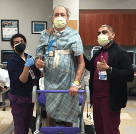
As a past recipient of a kidney transplant, Thomas was susceptible to
complications and had to be placed on a ventilator when his lungs failed and
started on IV antibiotic therapy to treat a septic infection. After he had
been stabilized, Thomas was transferred to Kindred Hospital Dallas Central
where he could receive ongoing medical care, respiratory therapy and
rehabilitation. When he first arrived he was unresponsive and required
maximum assistance from his caregivers for all his needs, but with diligent
care from his team and respiratory therapists he began to regain
consciousness and steadily recovered his lung strength until he was able to
be weaned from the ventilator. Thomas also progressed to being able to stand
and begin to do more of the activities of daily life by the time he was
ready to be discharged to continue his journey to recovery.
“I just want to say thank you to everyone who cared for me and for
everything you did for me,” Thomas expressed before he left Kindred.
Lisa
“The team here was wonderful.”
Lisa developed a fever and dry cough and started to have difficulty breathing.
Learn more about Lisa

When her symptoms worsened rapidly she had to be flown by air ambulance to a
general hospital and began to receive treatment for COVID-19. Lisa was
placed on a ventilator, received antibiotic therapy and was then transferred
to Kindred Hospital Dallas Central where she could receive respiratory
therapy and rehabilitation. At the beginning of her stay Lisa was
unresponsive and required full attention from her caregivers for all her
needs. Her respiratory team worked with Lisa to strengthen her lungs, and as
she became more alert and oriented she started to make rapid progress. Her
first milestone was reached when she was able to be weaned from the
ventilator and required only supplemental oxygen. Her rehab team helped Lisa
begin to reclaim her mobility and independence, and Lisa was soon able to
feed herself and begin to get back her independence over the activities of
daily life.
“The team here was wonderful,” Lisa shared before she was
discharged to continue on her journey to recovery. “I am grateful to
my team and plan to come back and say thank you when I’m all
better.”
Juan
“We are very happy with the service and care at Kindred and Juan’s
outcomes.”
Juan was driving his car when he began to feel numbness and weakness in the
left side of his body.
Learn more about Juan

He drove himself to the ER and was diagnosed to have experienced a stroke
from a cranial hemorrhage. His condition deteriorated and led to respiratory
failure, requiring Juan to be placed on a ventilator and started on
intensive care. Soon after the incident, his family was advised that they
might want to consider palliative care, but they declined and opted to
pursue treatment and recovery, and as soon as Juan was stable enough to be
transferred he was brought to Kindred Hospital Dallas Central. He began to
receive treatment from an interdisciplinary team and was started on
aggressive respiratory therapy to strengthen his lungs. Although Juan was
minimally responsive, he began to make progress with dedicated care from his
team and his wife, Olga, at his side every day. Juan’s first major
recovery milestone was reached when he was taken off the vent and could
breathe on his own. He then had the breathing tube removed and started to
work with his speech-language pathologist who helped him recover his
cognition and communication abilities. A major pressure wound that Juan
developed at the acute care facility was healed during his stay at Kindred,
and his rehab team guided the recovery of his fine motor skills, mobility
and independence.
“We are very happy with the service and care at Kindred and
Juan’s outcomes,” Olga shared. “We’re looking
forward to continuing his recovery process.”
Koumpheng
“Thank you all for everything you have done for him.”
At the beginning of the year Houmpheng underwent back surgery and developed a
severe septic infection from a perforation to his small intestine that led to
shortness of breath, chest and abdominal pain, acute swelling of his arms and
legs and kidney failure.
Learn more about Koumpheng
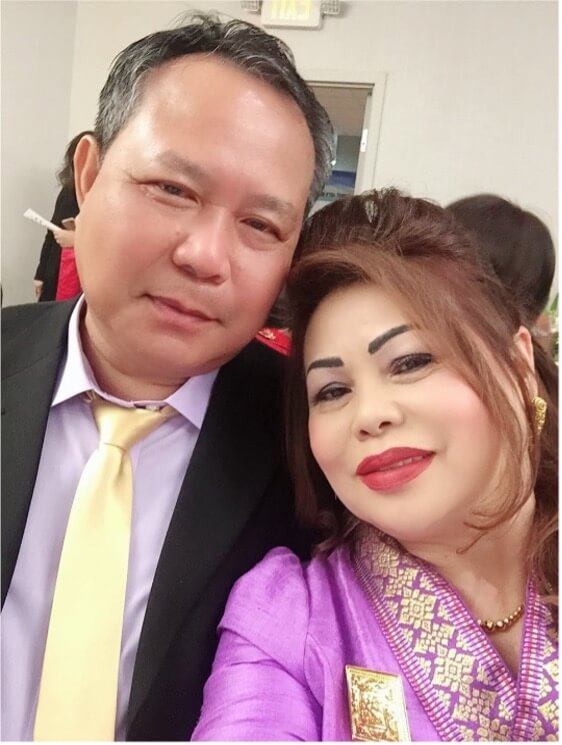
He was placed on a ventilator and started on dialysis and IV antibiotics,
and Houmpheng also received treatment for swelling of his brain and a
pulmonary embolism. He remained in the ICU until he was stabilized and could
be transferred to Kindred Hospital Dallas Central where he could receive
respiratory therapy, wound care, ongoing medical treatment and
rehabilitation. With his wife, Kongseng, at his side, Houmpheng slowly
regained consciousness and began to show definite signs of recovery, despite
the poor prognosis his wife had been given before her husband came to
Kindred. Kongseng and his family helped him remain motivated to participate
in his therapy and rehab sessions, and he steadily improved until he was
able to be taken off the vent. The next challenge Houmpheng faced was to
regain his mobility and independence, and although he initially had no
control or movement at all in any of his limbs, he steadily improved until
he was able to sit up unsupported and begin to use his right hand to feed
himself and perform the tasks of daily life.
“My family and I are very pleased with his recovery outcomes,”
Kongseng shared before her husband was discharged to continue his journey to
recovery. “Thank you all for everything you have done for him.”
Karen
“Thank you for all you did for her.”
Karen is a two-time heart transplant recipient who developed complications
after her second transplantation and remained in the ICU for several months,
dependent on a ventilator and dialysis due to respiratory and kidney failure.
Learn more about Karen

She was weaned off the vent before she was transferred to Kindred Hospital
Dallas Central to receive ongoing medical care, advanced wound care and
rehabilitation. At the beginning of her stay, Karen was experiencing
significant pain from her surgical wound site as well as her lower body, and
was extremely weak, requiring full assistance from her caregivers. Her
interdisciplinary team worked together to heal her wounds, improve her
strength and mobility and restore her independence over the activities of
daily life. With constant support from her family and dedicated care from
her team, Karen made steady progress and improved in all areas of her care
plan. Now able to stand up, walk with a rolling walker, and begin to do most
of the basic daily tasks, Karen is finally looking forward to being able to
go home soon.
“Thank you for all you did for her,” Karen’s sister shared
before she was discharged. “We are all grateful for the care that you
gave her.”
Kay
“This was a long journey.”
Kay had endured a long waiting period for a heart transplant as her birth
heart was failing. When she was finally able to have the transplant performed
at the beginning of the year, she unfortunately developed multi-organ failure
and numerous complications, including acute respiratory failure.
Learn more about Kay
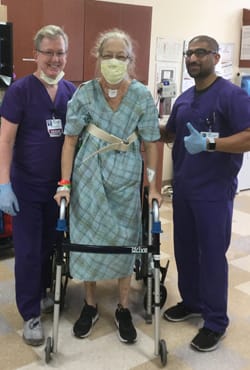
Her physicians worked hard to stabilize her condition and finally managed to
wean her from the ventilator nearly a month after her transplant. Kay was
able to be transferred to Kindred Hospital Dallas Central where she would
begin to receive additional respiratory therapy to strengthen her lungs, and
rehabilitation to enable her to reclaim her independence and return home.
Kay was completely dependent on her team of caregivers for all her needs as
she was extremely debilitated and couldn’t even lift her arms or legs
on her own. She was guided by her physical and occupational therapists who
worked with her seven days a week until she was finally able to stand and
walk on her own and take care of her daily needs. Her speech pathologist
helped her reclaim the ability to speak using a voice valve at first and
then, when the breathing tube had been removed, Kay was able to once again
speak with her own voice and begin to drink and eat a normal diet.
“This was a long journey,” Kay shared before she was discharged.
“I had to fight confusion and depression along the way, but I’m
grateful for the care I received and for having the support of my husband
and daughter every step of the way.”
Hillary
“When I first came to Kindred I could hardly reach my head.”
Hillary was admitted to Kindred Hospital Dallas Central for respiratory
therapy so she could be weaned from the ventilator. She also had pressure
wounds from prolonged bed rest, was extremely weak and malnourished, and was
completing a course of IV antibiotics to treat her pneumonia.
Learn more about Hillary
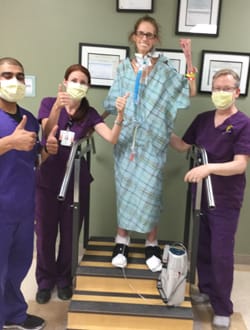
At the beginning, Hillary was unable to lift her arms or legs and required
complete assistance from her caregiver for all her needs; but she was
motivated and engaged and began to make progress with her respiratory
therapists, and was able to be taken off the ventilator successfully.
She then was able to have the breathing tube removed and her speech
pathologists helped her regain the ability to swallow so she could begin to
drink and eat a nourishing diet guided by her nutritionist. Her wound care
team helped to resolve her wounds and Hillary also made great strides with
her physical and occupational therapists and was soon up on her feet once
again and walking with minimal assistance. Hillary enjoyed the time she
spent in the rehab gym and was glad to start reclaiming her independence
before she was discharged from Kindred to continue her recovery.
“I’m grateful to everyone but my favorite therapist is
Dennis,” Hillary said about her certified occupational therapy
assistant. “He created an exercise plan that allowed me to get back
the strength I need to brush my own hair. When I first came to Kindred I
could hardly reach my head.”